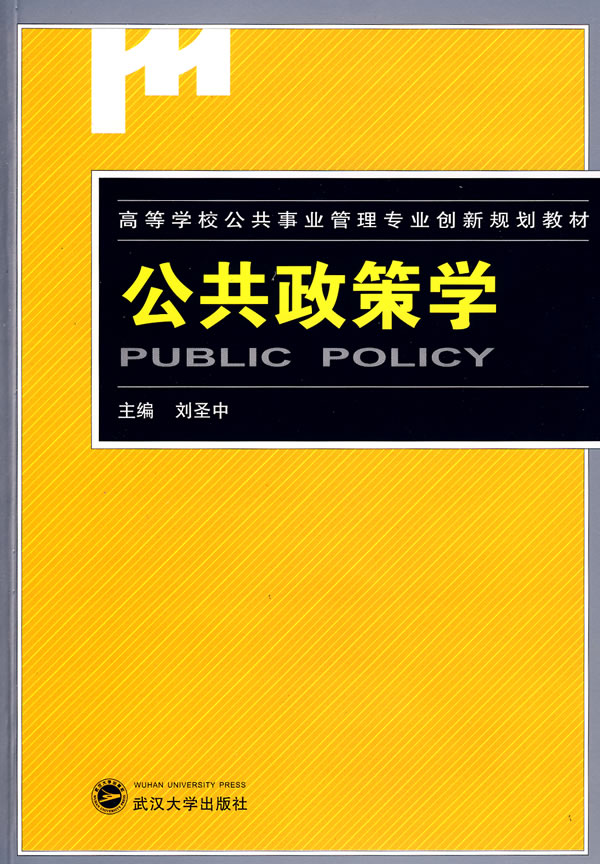Interdisciplinary cooperation to boost public policy research
-the 2nd Annual Conference on Public Policy convened at Nanjing University

One of textbook in public policy in China published by Wuhan University Press
Since the 1980s, Chinese public policy studies has been making strides, both in research and application. On April 27th to 28th, the 2nd Annual Conference on Public Policy convened at Nanjing University. Scholars from Renmin University of China, Nanjing University, Wuhan University and Sun Yat-sen University explored the theme “challenges and responses to governance reform: the past and the future of Chinese public policy studies.” Attendees also put forth suggestions for policy makers.
Making decision-making more scientific
Public policy research has two fundamental tracks, policy-process study and policy analysis, explained Zhu Chunkui, a professor at Fudan University’s School of International Relations and Public Affairs. Policy-process study is, as the name implies, the study of how governing bodies formulate and implement policy, while policy analysis is more concerned with assessing the results of policy using policy-analysis tools and building a base of knowledge to deal with future policy issues.
“With the rise of policy research (in China), the results that foreign countries have attained using policy research tools are gradually being introduced to China,” Zhu said. He added that these tools will provide ‘positive energy’ in order to make government decision-making more scientific.
Mao Shoulong, a professor of the School of Public Administration and Policy at Renmin University of China, believes that based on social need, the policy of reform and opening up should be the focal point of public policy research. Mao reviewed the history of economic policy research in China, elaborating that academia was primarily concerned with rural reforms and price reforms during the 1980s, and capital market and state-owned-enterprise reforms in the 1990s. In the past decade, the most pressing issues of study have concerned coping with globalization and the financial crisis, he continued. Turning to social policy, Mao explained that policy research on livelihood security has emerged become the new focus of attention from academia, along with emergency management.
Institutionalizing a development platform for public policy
According to Yue Jinglun, a professor from the School of Government at Sun Yat-sen University noted, “More and more scholars are interested in the field of public policy,” he affirmed. “However, it is still in a relatively low position in the schema of Chinese disciplines. The actual practice of public policy is out of touch with the theory that’s supposed to be behind it, while there are no standardized guidelines and approaches for research.” To correct these tendencies, Yue suggested that Chinese public policy research institutionalize a development platform as soon as possible.
The implementation of Chinese public policy includes three analytic patterns, “from-top-to-bottom”, “from-bottom-to-top” and “integrated” patterns, explained Ding Huang, a professor from the School of Political Science and Public Administration at Wuhan University. Ding noted that these differ from Western policy implementations, in that they are processed simultaneously and that there are no inherent hierarchal relationships between them. He sees this as stunting the growth of knowledge and curtailing innovation in policy research.
Du Haifeng, vice dean of the School of Public Policy and Administration at Xi’an Jiaotong Univeristy, agreed that China is playing catch-up in the field of publc policy studies. He also noted that research in China by and large relies on qualitative analysis and methodologies. There are tremendous disparities between domestic research standards and the theory and practice of public policy, versus those of foreign research in related fields, he said.
Attracting societal attention
Attendees at the conference attested to the general state of affairs of, public policy research in Chinese colleges and universities has remained lacking in a several aspects. Namely, cultivating fresh talent and establishing the next teams of researchers, and absorbing more foreign theoretical understanding are crucial.
Elaborating on the needs of the discipline, Zhu Chunkui called for strengthening public policy through exchange with different disciplines such as economics and sociology; coupled with this, he advocated greater communication between policy makers and scholars. These kinds of collaboration will provide us with fruitful theories and extensive evidence by which we might make the public policy decision-making process more scientific and democratic.
We, as scholars, need to advance the issues of public policy as societal issues, Yue Jinglun advocated. “Public issues gradually become the focus of public attention because of social need,” he added. Yue perceives a need for articulating theories and conceptualizing methods that are specific to the issues faced by Chinese society. In particular, he noted that the whole milieu in which China’s public policy is written, enacted and studied will see substantial, durable improvements with the perfection of incentive-constraints, or in other words incentives which work to motivate agents to act in the interest of society.
Du Haifeng sees a lot of future for public policy analysis that uses complex systems theories from an interdisciplinary angle. He outlined a rudimentary flow of how such research and feedback loops might look:”social issues → academic research → policy research → practice in community → promotion of strategies and public policy”.
Mao Shoulong recommended a four-pronged approach for future Chinese public policy: an emphasis on theories, methodologies and patterns; a focus on the public policy process and analytical techniques; attention to intra and inter-disciplinary cooperation; and comparative study of public policy for each country.
The Chinese version appeared in Chinese Social Sciences Today, No. 445, May 3, 2013
Translated by Zhang Mengying

 PRINT
PRINT CLOSE
CLOSE